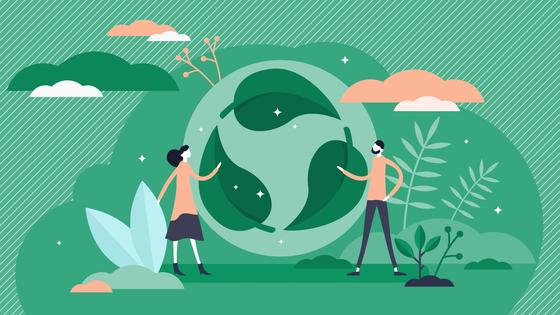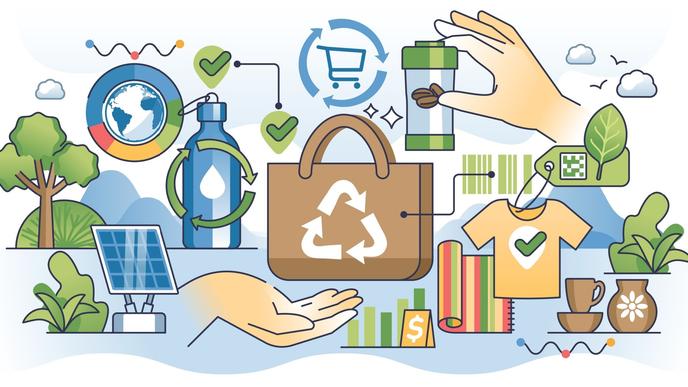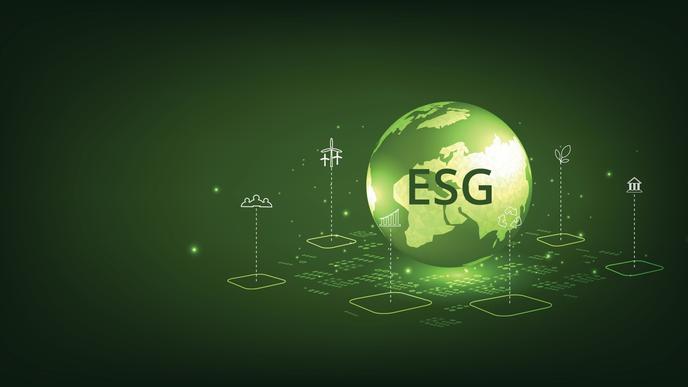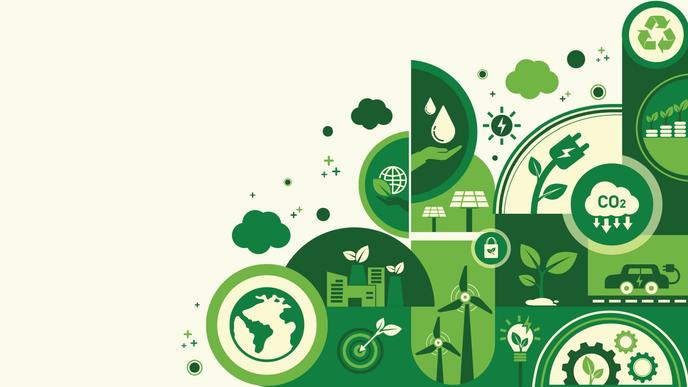Eco-Friendly Lifestyle: 2025 Trends
In today’s world, severe climate change and global pollution are no longer abstract concepts.

They've become tangible realities. Conscious consumption has therefore evolved from a hobby into a socially significant habit-though at the same time, the concept of "sustainability" has accumulated myths and marketing clichés.
In 2025, being eco-conscious means more than just sorting waste; it's about building an entire ecosystem with its own internal rules and routines. It encompasses food choices, digital habits, and even one's inner state.
Minimalism and Zero Waste: The Philosophy of Mindful Sufficiency

The trend toward minimalism, which began in the design industry, has now become popular in the context of environmental discussions. It's not about giving up all possessions, even essential ones, but about the principle of "less is better." Zero Waste is the practical embodiment of this philosophy. Its essence lies in striving to produce no waste at all, achieved through five key steps:
-
Refuse (decline what you don't need);
-
Reduce (cut down on consumption);
-
Reuse (use items again);
-
Recycle (process materials for reuse);
-
Rot (compost and return to nature).
This philosophy directly connects with digital minimalism. While Zero Waste focuses on mindful use and refusal of physical items, digital minimalism means tidying up your informational space.
Simply put, digital minimalism is a philosophy centered around the conscious use of only those gadgets that are truly necessary-say, for work. It's not a rejection of technology itself or just organizing files and emails. Rather, it's about avoiding things that distract, offer no deep value, or conflict with personal values.
In reality, digital clutter is a far more serious issue than it seems. Try unsubscribing from unnecessary newsletters and notifications, or reduce time spent aimlessly scrolling through feeds. What matters is not the number of tools you use but how effectively you use them. It's better to have three reliable, easy-to-use digital assistants than ten random apps installed "just in case." One calendar, one cloud storage, one task system-that's enough if used wisely.
Digital minimalism frees you from decision fatigue and helps you focus on meaningful action. Another simple practice is the digital detox slot: set 2-3 specific time slots per day to check your email or social media, and avoid them outside those times. Within a week, you'll notice you're getting more done and feeling less stressed. Technology stops stealing your time and starts helping you structure it.
By combining these two approaches-Zero Waste in the physical world and digital minimalism in the digital one-you create an eco-friendly environment around yourself, reducing both informational noise and physical waste simultaneously.
ESG and Corporate Responsibility: Why Business Has Gone "Green"

The acronym ESG stands for Environmental, Social, and Governance. Investors and major funds increasingly refuse to support companies with low ESG ratings, while consumers prefer brands that demonstrate real, not just declarative, change.
In 2025, corporate environmental trends have reached a new level:
-
Digital Ecology. Large IT companies are switching data centers to renewable energy and optimizing algorithms to reduce power consumption. A simple, minimalist website design isn't just about usability-it also reduces the carbon footprint.
-
Circular Economy. Brands now take responsibility for the entire product life cycle. Services for renting equipment, repairing clothes, and using reusable containers are transforming one-time purchases into long-term solutions.
-
Green Logistics. Expanding electric vehicle delivery networks, using cardboard packaging without plastic inserts, and optimizing delivery routes are now competitive advantages.
For consumers, this means making eco-friendly choices is easier than ever. Businesses take on the complex work of creating "green" infrastructure; our role is simply to support it with our decisions.
Lectera’s Online Courses by topic
Simple Steps for Everyday Life: Sustainability as a System

Don't expect to transform your life overnight. Start small but stay consistent. Sustainability is a system of habits.
-
Audit your consumption. Once a month, review your receipts. Which purchases were impulsive? What could you have done without? This helps identify unnecessary spending categories and encourages more mindful future choices.
-
Install a faucet aerator, which reduces water consumption by 30-50%. Drink filtered tap water instead of bottled-this can cut hundreds of plastic bottles a year.
-
Carry a foldable eco-bag for spontaneous shopping, a reusable coffee cup (many cafes even offer discounts for this), and a water thermos.
-
In the evening, about an hour before bedtime, try putting away your gadgets. Don't open social media or stream shows-read a book, meditate, or draw instead. This gives your nervous system genuine rest.
-
Before ordering a taxi, consider whether you can walk or bike to your destination within 30 minutes. It's good for your health, your wallet, and the planet.
-
Ditch disposable cleaning products. Use reusable cloths and refillable spray bottles instead of wet wipes. Buy concentrated cleaners and dilute them at home to reduce plastic waste.
-
Learn basic clothing repair. Sew on a button, mend a torn seam, or take shoes to a repair shop. It can extend the life of your items by years.
Ultimately, conscious consumption is not only about clean air and plastic-free oceans-it's also about mental health and quality of life. The constant chase for new possessions, fueled by consumer culture, breeds chronic stress, anxiety, and dissatisfaction.
By choosing an eco-friendly lifestyle, we choose:
-
Freedom from imposed desires. We stop being controlled consumers and begin consciously choosing what we truly need.
-
A sense of community. Realizing that your small actions contribute to a global positive movement brings motivation, optimism, and faith in the future.
-
Clarity of mind. Minimalism and mindful consumption clear both physical and mental space, allowing us to focus on what truly matters-relationships, hobbies, and personal growth.
Sustainability is an intellectual and ethical choice-a commitment to a smarter, healthier, and more meaningful life where technology and consumption serve us rather than control us. All it takes is one small habit to begin; it will transform not only your life but the world around you.
Share this with your friends via:
Latest News

A significant stage in the development of the alternative education system has begun in West Northamptonshire in the UK: the County Council is actively calling on parents, guardians, and trustees to participate in shaping the future of this key area.

Outwoods Primary School in Atherstone, Warwickshire, having experienced deep sadness after the loss of their famous cat, Silla, has found solace in a new pet – a Maine Coon named Aloysius O’Hara.

In modern universities, artificial intelligence, and in particular ChatGPT, is rapidly transforming from a controversial tool into a full-fledged student assistant.

An innovative educational project is gaining momentum in UK primary schools, aiming to change attitudes towards video games.

The Massachusetts Institute of Technology (MIT) presents MIT Learn – a revolutionary online platform that opens a “new front door” to access university knowledge and resources.












 “I’m Here for the Long Haul”: When Loyalty to a Company Becomes Toxic
“I’m Here for the Long Haul”: When Loyalty to a Company Becomes Toxic
 Freelancing, Remote Work, Office Jobs, or Consulting: How to Choose the Work Format That’s Right for You
Freelancing, Remote Work, Office Jobs, or Consulting: How to Choose the Work Format That’s Right for You
 Test: How Prone Are You to Abusive Behavior as a Manager?
Test: How Prone Are You to Abusive Behavior as a Manager?
 Test. What superpower would you possess if you were a superhero?
Test. What superpower would you possess if you were a superhero?
 Test. What Should You Let Go of Before Winter Ends?
Test. What Should You Let Go of Before Winter Ends?
 Test. Which Ritual Should You Start Practicing This Winter?
Test. Which Ritual Should You Start Practicing This Winter?
